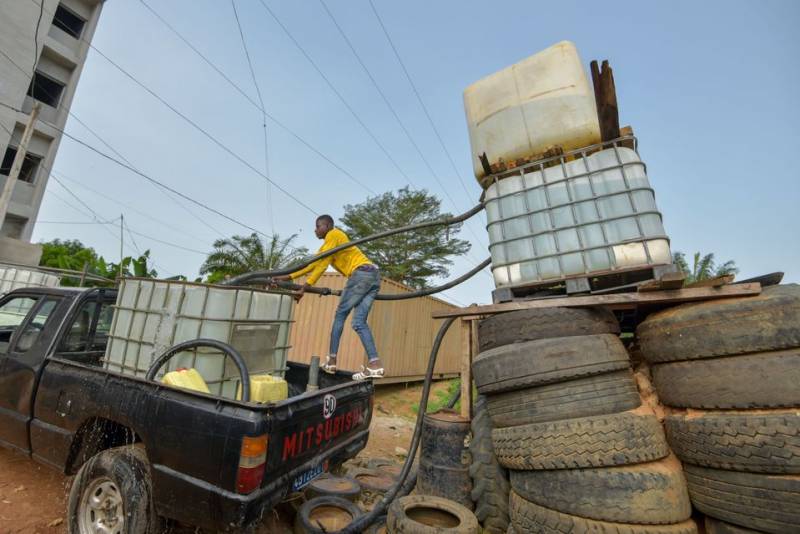A reseller of water fills a jerrycan in Abidjan, Côte d'Ivoire, where inhabitants face water shortages.
As Germany prepares to host G-7 leaders in Schloss Elmau for its annual summit, Africa continues to struggle with the Covid-19 crisis. While other parts of the world have seen fast recoveries due to robust stimulus and vaccine support, Africa still features the lowest vaccination rates in the world: only 17.7%.
On top of a slow ongoing recovery from the pandemic, the Ukraine war raises new concerns for those living in Africa. Rising food, fuel and fertilizer prices will add to the more than 40 million people who have fallen into poverty in the past few years; a striking reversal of encouraging trends from the previous two decades. The growing severity and frequency of climate shocks in the region will worsen food shortages and their impacts on the poorest people in the continent.
Africa needs $1.3 trillion a year to achieve the Sustainable Development Goals, global commitments to end poverty and hunger, tackle climate and infrastructure challenges that would bring transformational improvements to people in the continent. Africa remains far behind in meeting these global aspirations that the international community agreed upon in 2015. At the same time, its debts reached a staggering 70% of the economy in the first year of the pandemic.
The leadership and agency of African countries are essential to meet the sustainable development goals, but they only stand a chance if there is a strong and rapid mobilization of external resources led by the international community as well. At their upcoming meeting, the G-7 can send a strong signal that, in spite of the headwinds, they are committed to support Africa’s development in three key areas.
First, G-7 countries must prioritize the creation of an orderly and reliable process to restructure sovereign debt.
The G-20 took a positive step in this direction with the creation of the Common Framework for Debt Treatment. But the three countries that attempted to use the G-20-set process remain, more than a year later, mired in an uncertain limbo.
The G-7 should express unambiguous support for substantive changes in this debt reduction process, to encourage the trust of the massive number of debtors needing relief. It is not too late to act before crises get out of hand and are much more expensive to solve. The process should guarantee an immediate suspension in debt payments until achieving a full settlement with creditors, rapid and efficient decisions, comprehensive creditor participation, and access for any vulnerable country, regardless of income level. Private creditors should know they face consequences if they do not contribute their fair share.
The World Bank and the International Monetary Fund’s intellectual leadership has been crucial in putting reforms on the table for discussion. But they should proactively facilitate action by compiling crucial information on which countries need what amount of relief, from whom. Only a collective analysis of their situation can provide the wake-up call the creditor community needs right now, and the G-7 can request that analysis.
Second, G-7 countries must maximize and accelerate deployment of special drawing rights.
Last year the IMF created $650 billion in emergency currency—special drawing rights—for coronavirus response and recovery aid. African countries received $33 billion of this, and are spending it on vaccine access, poverty-reducing and stimulus measures. But much more is needed. Rich countries hold more than $400 billion that they could transfer to countries in need, and have already pledged $60 billion to different IMF processes.
G-7 leaders should commit to more SDR transfers and more channels to carry them out. They can tie their commitments to assurance from recipients that they will set participatory and transparent strategies for applying SDRs to sustainable and climate goals. It is important that recycled SDRs do not create new debt, and come without harmful conditions such as austerity reforms that worsen human development or access to essential services. In particular, the African Development Bank and the International Fund for Agricultural Development, with their proven experience driving agricultural development, can harness the power of SDRs to stop a catastrophic food crisis in the region.
Finally, G-7 countries must create international financial and trade architecture to prevent future debt crises.
To create stable bases for a resilient recovery, G-7 leaders should work with African counterparts in creating a new international financial and trade architecture that prevents future debt crises. This requires four main elements. First, responsible lending and borrowing policies—African countries should commit to debt contract disclosure and authorization frameworks that make debt more transparent. The G-7 include key creditor jurisdictions and should commit to pass reforms that bar enforcement of claims unless they meet such standards. Second, in a world that is prone to more shocks, future debt should have creditors and debtors share the exposure to them. Third, more sources of increased concessional, long-term financing for development are needed. Finally, to sustain healthy debt levels Africa needs to boost its trade engine. Its current paltry share of world trade, 3%, could expand to much more given the right rules. The appointment of an African leader, Ngozi Okonjo-Iweala, at the helm of the World Trade Organization, is a commendable opportunity to bring about change, but she will need political backing from all members. The G-7 political commitment would make a huge difference.
Matthew Hassan Kukah




